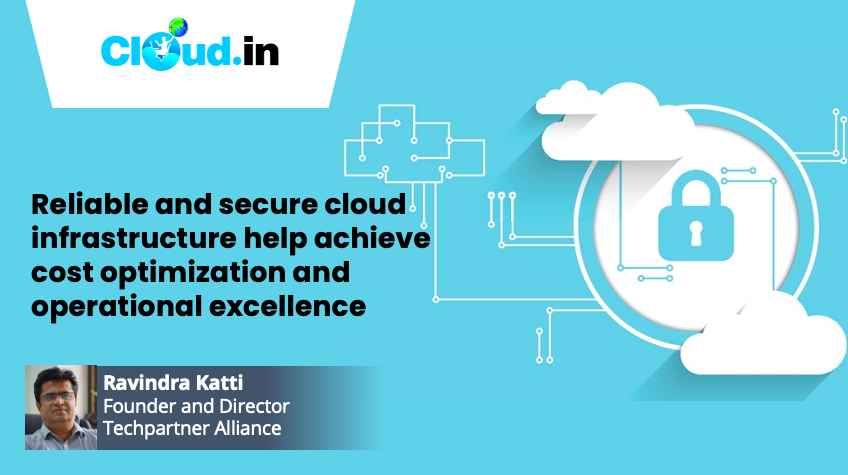Reliable and secure cloud infrastructure help achieve cost optimization and operational excellence - Ravindra katti, Founder and Director, Techpartner Alliance

In today’s digitalization era, with
online communication and transactions, storing and accessing information by
both businesses and consumers is a critical factor.
Cloud computing
has revolutionized this process by empowering users with computing power and
storage capacity. With an internet connection, users
can access data, applications, and computing
resources, anytime, from any device and any location across the globe.
Cloud computing offers several advantages such as scalability, flexibility, reduction in cost, security, faster time-to-market, mobility, increased collaboration, data loss prevention, and disaster recovery among a few others.
With media headlines highlighting
security breaches coupled with rising cloud infrastructure costs and a dearth of talent, cloud computing may seem far
less reliable than the good old on-prem
infrastructure. Yes, when businesses have decided to migrate apps or services
to the cloud, the new infrastructure should
function smoothly, and uninterrupted for all users, irrespective of the device they use or the location they
operate from.
Security breaches, server downtime or other component and software failures, and errors by users, can lead to system breakdowns. Yes, assessing the reliability of the cloud is very crucial and it confirms that the system is up and running at any given point in time. Today, as mentioned earlier there is a growing number of businesses on the cloud, and all related systems have to be extremely dependable.
The reliability of cloud computing depends on key factors which are elaborated on, in the new few paragraphs.
Determine if the cloud is really
cost-effective
The initial cost to set up or upfront
investment in cloud computing is much less
when compared to building a dedicated
infrastructure on the premises. Manpower and maintenance costs can be reduced
significantly. An increase in workforce productivity is made possible with the
automation capabilities of the cloud. More money can be saved with the long-
term usage of cloud services. Although vendors claim that it is financially advantageous by migrating workloads to the cloud with no burden of capital investment, leveraging the pay-as-you-go model, is not always cost-efficient. It may sometimes result in receiving huge bills due to carelessness where users fail to switch off services or resources when not required or fail to leverage discount benefits. Relevant measures have to be put in place for ensuring cost optimization on the cloud. Visibility into cloud performance can help teams to control costs and reduce spending wherever possible.
Cloud performance matters
Cloud performance matters because it directly affects user experience. Cloud performance can also affect the scalability of applications, leading to increased costs for organizations. Additionally, poor cloud performance can lead to increased latency, resulting in higher latency for users and decreased performance for applications. Finally, cloud performance can have a direct impact on operational costs, as organizations may need to invest in additional infrastructure or personnel to address issues.
For improving performance, organizations can use CDN, Load Balancers, Cache data, Optimize Database queries, Implement Monitoring System, etc. Leveraging best-performing tools and technologies for automation can ensure organizations stay ahead of the curve. The automatic scaling in the cloud can result in computing power scaling up as and when required and effortlessly meeting unexpected spikes.
Robust Cloud Security is essential
It is widely perceived that security in
the cloud is not robust and the data and applications are prone to potential external cyber-attacks, stopping
organizations from migrating to the cloud from
on-prem. Reliable cloud services offer robust security and enable organizations
to gain sufficient control and the required
confidence for smooth functioning. With
automation, their data centers and networks are continuously upgraded for security and compliance requirements. Cloud security policies, security mechanisms, and controls have to be audited with the industry’s best practices to ensure the reliability of the cloud.
Cloud Security should follow a shared responsibility model, as AWS is responsibility of ‘Security of the Cloud’ like protecting infrastructure (hardware, software, facilities & networking) that runs all the AWS services & managed services like S3, DynamoDB, RDS,etc. Customers should take the responsibility of ‘Security in the Cloud’ like managing the security of the network infrastructure, business application management, and guest operating system, in addition to business and customer data.
To ensure operational excellence on the cloud, it is advisable for businesses to make provisions for small and frequent deployments while designing workloads. Operating procedures have to be evaluated regularly and improved wherever necessary to increase efficiency. Anticipating and learning from operational failures and sharing them with the rest of the team, is another important aspect that cannot be missed while establishing operational excellence. Assigning responsibilities to respective departments, be it, IT operations or engineering is crucial to the organization’s success while achieving its business objectives.



